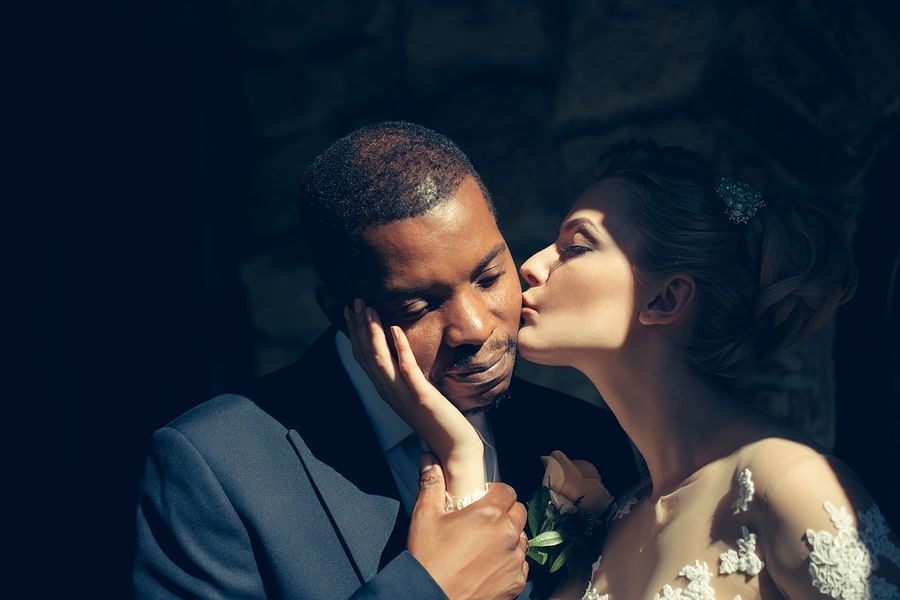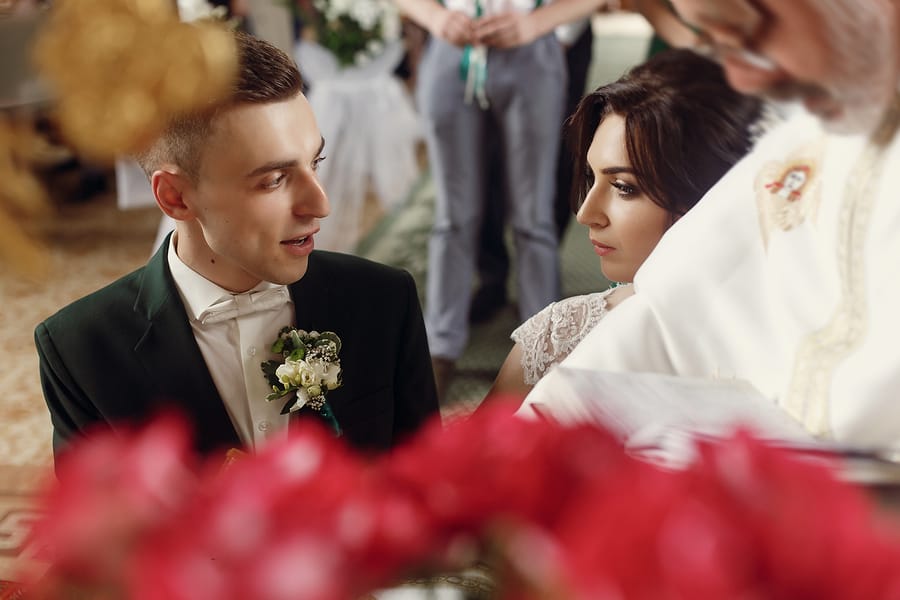Actually putting words on paper can be scary. Here are some things to keep in mind while you’re writing your own vows.
If you’re like most engaged people, you’ve been so busy with the venue, and the catering, and the guest list that you somehow forget about the vows until the last minute.
And if you’re like me, you were totally distracted looking at cakes (I’m a sucker for sugar) and got very behind.
But while it sometimes gets shuffled to the back of your mind, you can’t forget about the vows. They’re the most central part of the wedding, and you want to give a lot of attention to what you say to your partner.
In my scramble and frustration to get my vows written, I asked a lot of married friends for their advice, consulted every website I could think of, and watched a hundred (or so) Youtube videos of ceremonies. Here are 10 things I learned.
1. Think about how you want to set the mood.
Before you start writing your own vows, you and your sweetie should decide on a “feel” for your ceremony. Maybe you’re a fun-loving, giggly couple and you want your vows to show that. Or maybe you want the ceremony to be a little more serious, and a major tear-jerker. Maybe it’s really important that your vows are very traditional, or maybe you want to center it around your history together. Vows can go in so many directions and its best to start on the same page with the same goal.
2. Does the use of props make sense?
Sand ceremonies or lighting candles might not necessarily be a part of the actual vows, but they do go hand-in-hand. If you’re interested in one of these things, you’ll want to decide what you’re doing before you write the vows. For example: if you’re doing a sand ceremony, your vows can include references to how your differences blend together, so the sand will make sense when it comes time to pour it.
If you’re interested in incorporating something like this, here are a few ideas:
- Handfasting: This Celtic tradition involves holding hands and wrapping a ceremonial rope around them. If you like this idea, you can talk about being bound together forever.
- Ring warming: Passing your rings around to be warmed before you put them on will make guests feel like they are a part of your ceremony. This is perfect if you want to incorporate a family-feel into your vows.
- Time capsule: This is when couples write letters to each other and pack them into a box (sometimes with a bottle of wine), which are opened at a later date. It’s a perfect anniversary present for future-you, and it’s a great opportunity to talk about your future together in your vows.
- Plant a tree: For nature lovers out there, planting a tree can be a beautiful way to symbolize the strength of your growing relationship — and it can be a perfect theme for your vows. Whether you’re planting it in your backyard or in a public place, it will be wonderful to visit the tree down the road to see how much it (and you both) have grown.
3. Decide on what you don’t want.
So many people focus on what they want in their vows but forget to nix the things they don’t want. The most popular bit to take out in the traditional vows is the “obey” line. A lot of people find it old-fashioned, and that’s okay! Many couples choose not to change their last names when they get married, so they need to make sure their officiant doesn’t say “Mr. and Mrs.” at the end of the ceremony. These may seem like small things, but if it’s going to make you cringe every time you watch your wedding video, make sure you discuss what you don’t want with your future spouse.
4. Remember: the “repeat after me” part can be anything!
Speaking of the “obey” line in those traditional vows, remember you can have those “repeat after me” vows be completely original. You don’t have to have the “for richer, for poorer” vows for your wedding (unless it is required by your faith), and it can be fun to make up your own. They should represent what you want to promise, so make it special. Here are some great examples from The Knot.
5. Speak from the heart.
We all want our vows to be the coolest, most romantic vows in the world, but the best thing is to just be genuine. If you love playing soccer together, mention that. If you’re favorite thing about your spouse is their crazy jokes, say that. Sometimes you have to forget about what it’s going to sound like to the audience, and remember what means the most to you.
6. Coordinate with your partner.
If you’re writing your own vows separately, just make sure you coordinate with your future mate. You don’t want to both tell the same story or have one of you give a long, gooshy speech about love when the other says something short and sweet. You don’t want to give a list of all the things you promise to do while your partner skips promises in favor of saying how important your relationship is. That can come across as unorganized.
7. Keep it to one or two minutes.
It might sound short, but a minute of talking in front of all your family and friends will seem like forever when you’re up there. A minute is plenty, or maybe go to two minutes if you have a really good story to tell. Some may find they really have to edit their words down while others will feel a roadblock after the second sentence. Keep working on it, and keep this timeframe in mind.
8. Take your time.
After writing your own vows, leave them for a few days and come back. Make notes in your phone when you come up with an idea in the middle of the day. Sometimes those perfect words won’t come out right away, and that’s okay. Know that it’s hard for most people to express all those feelings on paper.
9. Talk to your officiant.
Once you have an draft of your vows, talk to your officiant and coordinate. If the officiant is a friend that has known you both for a long time, he or she might want to say a couple things about you or share some memories during the service. Make sure you guys are on the same page with anecdotes. If your officiant is your local minister who’s done all the weddings in your church for the last 20 years, they might have some ideas of what will work well and how to change it up. Either way, this is the perfect time to talk about your vision and make sure you have a plan.
10. Write them down and type them up.
This might seem obvious, but you’ll want to write your vows down. You might even want to put them in a cute notepad or on a high quality piece of paper to read at the altar. Recently, some people have been reading their vows off their phones, and while this might seem fun and modern now, it will look dated a few years down the road. Going with the classic paper version is a safe bet.
But that doesn’t mean typing them up at all isn’t a good idea. In addition to writing them on paper, it’s a good idea to put them in your computer in case you lose your notebook a week before the wedding. Then, after the wedding, you might want to make a keepsake out of your vows: like a copy to put in a book or a framed a copy for your wall. If they’re typed up, you don’t have to worry about losing the paper in your wedding festivities — you can just press print.
With these 10 simple tips, you’ll be writing your own vows with confidence — because of their quality and because you’ll cherish them for all time.
For more wedding day advice, check out “Picking And Choosing Wedding Advice That Works For You” or “Marriage 101: Expectations Vs. Reality.”


